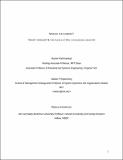| dc.contributor.author | Rahmandad, Hazhir | |
| dc.contributor.author | Henderson, Rebecca | |
| dc.contributor.author | Repenning, Nelson | |
| dc.date.accessioned | 2019-02-28T14:21:49Z | |
| dc.date.available | 2019-02-28T14:21:49Z | |
| dc.date.issued | 2016-11 | |
| dc.date.submitted | 2010-08 | |
| dc.identifier.issn | 0025-1909 | |
| dc.identifier.issn | 1526-5501 | |
| dc.identifier.uri | http://hdl.handle.net/1721.1/120570 | |
| dc.description.abstract | Recent work suggests that an excessive focus on "managing the numbers"- delivering quarterly earnings at the expense of longer-term performance-makes it difficult for firms to make the investments necessary to build competitive advantage. "Short termism" has been blamed for everything from the decline of the U.S. Automobile industry to the low penetration of techniques such as total quality management and continuous improvement. Yet a significant body of research suggests that firms that sacrifice longterm investment to manage earnings are often rewarded for doing so. This paper presents a model to help reconcile the tension between these apparently contradictory perspectives. We show that if the source of long-term advantage is modeled as a stock of capability that accumulates over time, the intensity of the firm's effort to manage short-term earnings at the expense of long-term investment can have very different consequences depending on whether the firm's capability is close to a critical "tipping threshold." When the firm operates above this threshold, aggressively managing earnings smooths revenue and cash flow with few long-term consequences. Below it, managing earnings can tip the firm into a vicious cycle of accelerating decline. Our results have important implications for understanding managerial incentives and the internal processes that create sustained advantage. Keywords: capability; short-termism; system dynamics; tipping point; resource allocation | en_US |
| dc.publisher | Institute for Operations Research and the Management Sciences (INFORMS) | en_US |
| dc.relation.isversionof | http://dx.doi.org/10.1287/MNSC.2016.2670 | en_US |
| dc.rights | Creative Commons Attribution-Noncommercial-Share Alike | en_US |
| dc.rights.uri | http://creativecommons.org/licenses/by-nc-sa/4.0/ | en_US |
| dc.source | Other repository | en_US |
| dc.title | Making the Numbers? “Short Termism” and the Puzzle of Only Occasional Disaster | en_US |
| dc.type | Article | en_US |
| dc.identifier.citation | Rahmandad, Hazhir et al. “Making the Numbers? ‘Short Termism’ and the Puzzle of Only Occasional Disaster.” Management Science 64, 3 (March 2018): 1328–1347 © 2016 INFORMS | en_US |
| dc.contributor.department | Sloan School of Management | en_US |
| dc.contributor.mitauthor | Repenning, Nelson | |
| dc.relation.journal | Management Science | en_US |
| dc.eprint.version | Original manuscript | en_US |
| dc.type.uri | http://purl.org/eprint/type/JournalArticle | en_US |
| eprint.status | http://purl.org/eprint/status/NonPeerReviewed | en_US |
| dc.date.updated | 2019-02-27T18:33:51Z | |
| dspace.orderedauthors | Rahmandad, Hazhir; Henderson, Rebecca; Repenning, Nelson P. | en_US |
| dspace.embargo.terms | N | en_US |
| dc.identifier.orcid | https://orcid.org/0000-0001-9832-131X | |
| mit.license | OPEN_ACCESS_POLICY | en_US |
